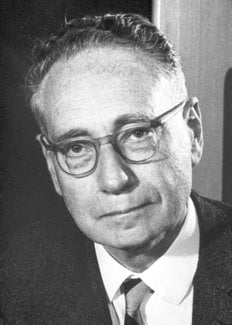Sir Bernard Katz
Biographical

Bernard Katz was born on March 26th, 1911, in Leipzig, Germany, of Russian Jewish origin, only son of Max Katz and Eugenie Rabinowitz. His school education was at the Albert Gymnasium in Leipzig (1921-1929). He studied Medicine at the University of Leipzig, 1929-1934; received the Siegfried Garten Prize for physiological research in 1933 and obtained his M.D. in 1934.
He left Germany in February 1935 and was accepted as a Ph. D. student by Professor A.V. Hill at University College, London. Katz worked in A.V. Hill’s laboratory until August 1939. He received a Ph.D. (London University) and a Beit Memorial Research Fellowship in 1938. In 1942, he was awarded the degree of Doctor of Science (London University).
In 1939, Bernard Katz joined J. C. Eccles‘ laboratory at Sydney Hospital, Australia, as a Carnegie Research Fellow. He collaborated with J. C. Eccles and S. W. Kuffler in neuromuscular research.
In 1942, after naturalization in 1941, he joined the Royal Australian Air Force, and served as a Radar Officer in the South West Pacific until the end of the war.
In 1946, returning from Australia to University College, London, Katz rejoined A.V. Hill’s research unit as Assistant Director of Research and Henry Head Research Fellow (appointed by the Royal Society). He was appointed Reader in Physiology in 1950; since 1952 he holds the post of Professor of Biophysics at University College, London.
Professor Katz was elected Fellow of the Royal Society in 1952; Fellow of the Royal College of Physicians in 1968. He is a Foreign Member of the Royal Danish Academy of Sciences and Letters (1968), Accademia Nazionale Lincei (1969); American Academy of Arts and Sciences (1969). Fellow of University College, London (1961). Feldberg Foundation Award (1965); Baly Medal, Royal College of Physicians, and Copley Medal, Royal Society (1967). He was knighted in 1969. He is a member of the Agricultural Research Council since 1967; Biological Secretary of the Royal Society since 1968.
The major fields of research of Professor Katz include: studies of nerve and muscle, especially of the physico-chemical mechanism of neuromuscular transmission.
In 1945, Bernard Katz married Marguerite Penly, of Cremorne, New South Wales. They have two children: David (born 1947), studying Pharmacology and Medicine in London, and Jonathan (born 1950), studying Classics at Pembroke College, Oxford.
This autobiography/biography was written at the time of the award and first published in the book series Les Prix Nobel. It was later edited and republished in Nobel Lectures. To cite this document, always state the source as shown above.
Sir Bernard Katz died on April 20, 2003.
Nobel Prizes and laureates
Six prizes were awarded for achievements that have conferred the greatest benefit to humankind. The 14 laureates' work and discoveries range from quantum tunnelling to promoting democratic rights.
See them all presented here.
